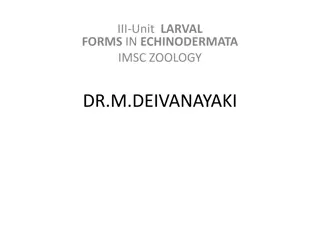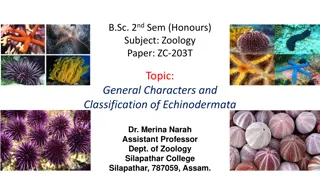Larval Forms in Echinodermata: A Study of Development Stages
Echinoderms, as deuterostomes, exhibit radial and indeterminate cleavage. Their larvae undergo metamorphosis to become adults through various stages. Different classes of echinoderms have distinct larval forms, such as Bipinnaria, Brachiolaria, Auricularia, and more. These larvae display bilateral s
0 views • 8 slides
General Characters and Classification of Echinodermata in Zoology: B.Sc. 2nd Sem
Echinoderms, marine animals with radial symmetry, feature a unique water vascular system. This content covers their general characteristics, five classes, and a classification table. Dr. Merina Narah from Silapathar College, Assam, presents valuable insights into the fascinating world of Echinoderma
0 views • 5 slides
Overview of Animal Kingdom's Phyla and Characteristics
Animals in the Kingdom Animalia have diverse characteristics and are classified into different phyla based on specific traits and features. This includes Porifera (sponges), Cnidaria (jellyfishes), Platyhelminthes (flatworms), Nematoda (roundworms), Annelida (earthworms), Mollusca (snails, octopus),
0 views • 10 slides
Exploring Mollusks and Echinoderms
Delve into the fascinating world of Mollusks and Echinoderms through this informative review. Learn about their unique characteristics such as radula, tube feet, gills, and bilateral symmetry. Discover the importance of these features in the diverse phyla of Mollusca and Echinodermata, including the
0 views • 25 slides



